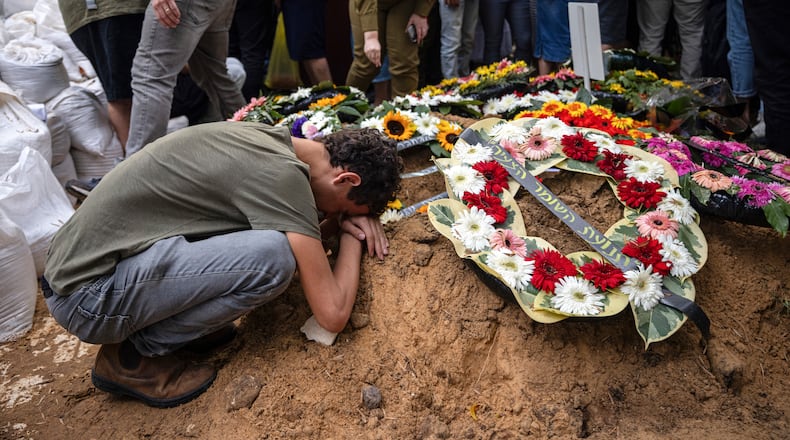Schear’s friends and her boyfriend’s family were telling her of an attack by Hamas, designated as a terrorist group by the U.S. and U.N., that left hundreds dead and thousands wounded in the Jewish state.
“My first thought was, ‘How do I get home?’” she said. “It seems counterintuitive, but to be here and stay here (in the U.S.) doesn’t help. It doesn’t help me, and it doesn’t help anyone else.”
On Monday, the death toll rose to nearly 1,600, the Associated Press reported, with around 900 people, including 73 soldiers, killed in Israel, and more than 680 people killed in Gaza according to authorities there.
During a press conference by the U.S. Department of Defense, one senior official called the initial attack “ISIS-level savagery” — referring to the Islamic State terrorist group, adding that it was an “unprecedented attack on Israel,” with houses burned to the ground and young people massacred at a music festival.
Schear and her boyfriend had friends at the music festival — some who were still missing Monday afternoon, and some who are among the more than 130 Israeli hostages.
“We have some friends that we can’t find. And some that we know are being held in Gaza,” she said.
Many of Schear’s neighbors and members of her boyfriend’s family have been called in for military service. Threats of violence from Hamas militants is a common occurrence, Schear said, adding “people still go to the beach if it’s a rocket or two.”
“This is the first time it’s been something like this,” she said.
The Dayton Daily News reached out to local individuals and organizations with connections to Palestinians, but they declined to comment, some citing fear of retaliation.
Suzanne Shaw, executive director of Dayton’s Temple Israel, said the congregation has several ties to Israel, including some congregants who have relatives who live there, former congregants who emigrated there years ago and one congregant who recently embarked on a year of studies.
Shaw said a congregational trip to Israel in January included a visit to the southern part near the Gaza border, which illustrated the constant danger the country faces.
“It just really hits home because we met quite a few people there and … we worry about the border here (in the U.S.) and people coming across because of drugs and other things, but they are surrounded by their enemies and they can’t just defend themselves on one border,” she said. “They have to defend themselves on all their borders, and I don’t think people really realize that over here.
“It just really hit home when you’re standing there and you can see three or four different countries that they’re up against, that would like them not to be there, so it’s a complicated situation.”
That complicated situation, said Schear, is something people living outside of Israel don’t always understand. In Tel Aviv, terror attacks target both Israeli and Arab communities, and violence is indiscriminate. Schear’s Arabic friends and neighbors also are suffering because of the actions of Hamas.
“It’s not really like they check your ID before they shoot you,” she said.
“What the world also doesn’t see is the daily coexistence between the Palestinians and Israelis,” Schear said. “I work in the market next to pretty much all Arabs, and there is no issue at all. They’re our friends. So when things like this happen, and people worldwide speak out, they don’t really know what is happening there, because now the Arabs who are there, they’re not celebrating. They’re scared to go outside.”


